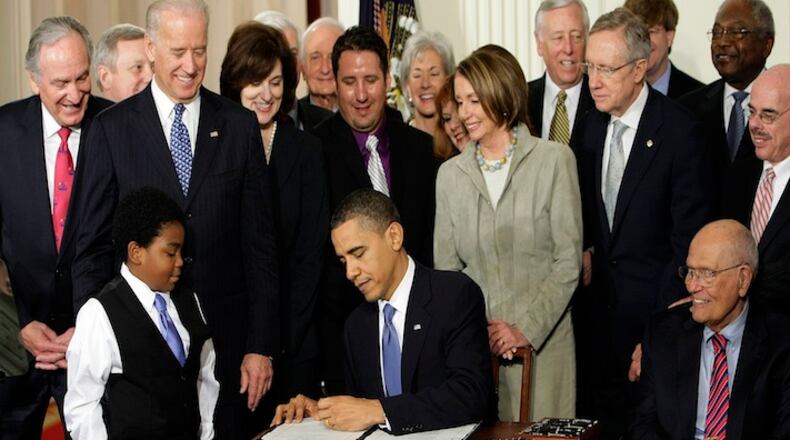States that fought and shunned the Affordable Care Act's Medicaid expansion, hoping to avoid the cost of covering millions of working-poor families, will be left with substantial growth in the program even after the Republican-led Congress unwinds the law.
From Florida and Texas to Georgia and North Carolina, enrollment in Medicaid and the Children's Health Insurance Program has soared since the passage of the health care law, as the poor and uninsured have come out of the woodwork to apply for coverage. And those new enrollees — 2.4 million people across 19 states that decided not to expand Medicaid — aren't going anywhere immediately after the incoming Donald Trump administration signs repeal legislation into law.
It's an ironic and unintended parting gift from President Barack Obama, whose namesake health care package triggered a rush to Medicaid that will leave some of the most conservative states in America spending more than expected to insure the poor after he leaves office than they did before he entered.
"The states that did not expand essentially saved nothing, collectively lost out, literally, on hundreds of billions of dollars in federal financing, left millions of people with no coverage and at the same time have experienced enrollment growth because of the streamlining in the Affordable Care Act. So they they ended up harming only their own populations and not helping themselves economically at all," said Sara Rosenbaum, professor of health policy and management at George Washington University.
Experts call the growth in Medicaid enrollment in states that did not expand "the woodwork effect." It refers to people eligible for Medicaid before the Affordable Care Act — but not enrolled — who joined amid public awareness campaigns for HealthCare.gov and the Medicaid expansion.
Those campaigns specifically targeted non-expansion states such as Florida, Texas, North Carolina and Georgia.
And it's precisely those states that are now grappling with bulging Medicaid rolls: Florida led the way with nearly 540,000 new Medicaid enrollees, a 17.4 percent increase; North Carolina added 408,000, up nearly 26 percent.
Texas and Georgia added roughly 290,000 and 214,000, respectively. Georgia's 14 percent enrollment growth more than doubled Texas' 6.5 percent increase.
Even when the Affordable Care Act is repealed, woodwork-effect enrollees in states that did not expand Medicaid are unlikely to lose their coverage.
That's because newly eligible Medicaid enrollees in expansion states can earn up to 138 percent of the federal poverty level, because of the health care law's relaxed income eligibility requirements. But woodwork enrollees in non-expansion states had to meet Medicaid's traditional state-income guidelines reserving coverage for very low-income applicants. Those earning thresholds are set by states and unlikely to change under any federal repeal legislation.
"The woodwork effect was definitely more significant than we initially expected in Medicaid," said Caroline Pearson, senior vice president at Avalere, a Washington health consulting business. "We really think it was largely (insurance marketplace) awareness that drove the increase in Medicaid enrollment, particularly in non-expansion states."
The woodwork effect was certainly intentional on the part of the Obama administration.
"The woodwork effect wasn't an accident," said Ben Sommers, associate professor of health policy and economics at Harvard University. "It was the result of policies in the ACA designed to improve participation among adults and children already eligible for the program."
These include the mandate that almost everyone have health insurance, Medicaid's simplified application and coverage renewal process, and elimination of the asset test for new applicants.
The Congressional Budget Office estimates that, nationwide, 2 million people who were Medicaid-eligible before the Affordable Care Act became law enrolled in the program in 2015 alone.
A recent study by researchers at Harvard University and the Massachusetts Institute of Technology estimated that 30 percent of national insurance coverage gains under the health care law in 2015 were because of Medicaid's woodwork effect.
In 2014, it was 44 percent, said Sommers, a co-author of both studies.
Sommers estimates that 1 million children nationwide have gained Medicaid or Children's Health Insurance Program coverage because of the woodwork effect, many after their parents learned they were eligible while shopping for coverage on the state insurance marketplaces.
About the Author
Keep Reading
The Latest
Featured




